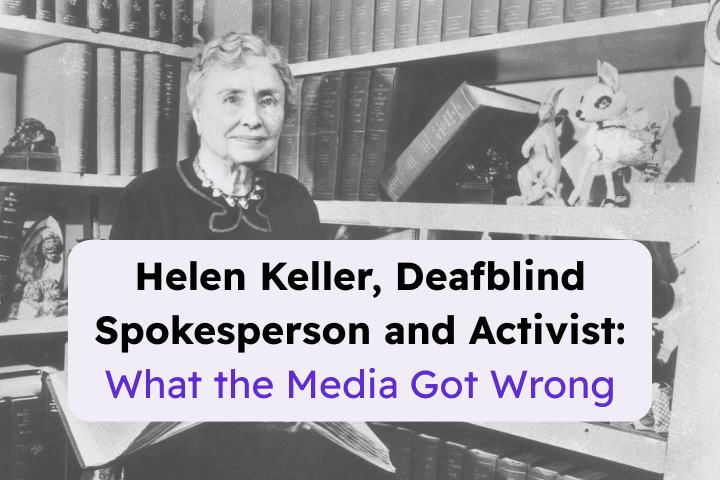All Articles
2 min read
What Helen Keller Taught Us — and What the Media Got Wrong
Written by
Purpl
Published on
June 24, 2025

You’ve probably seen her name around — maybe in a quote, a history book, or a well-meaning classroom poster. But who was Helen Keller? And why is she such a big deal, especially during Deafblind Awareness Week?
Helen Keller was an American author, lecturer and activist who became deafblind at just 19 months old. Despite growing up in a world with almost no accessibility, she became the first deafblind person to earn a university degree — and went on to change history.
But the version of Helen Keller most people hear about? It’s… let’s just say, incomplete.
Helen Keller Wasn’t Just Inspirational — She Was Radical
She didn’t just “learn how to talk” and call it a day. Helen Keller spent her life pushing boundaries, smashing stereotypes and fighting for justice.
Here’s what they don’t usually tell you:
- She co-founded the American Civil Liberties Union (ACLU)
- She was a socialist and campaigned for workers’ rights
- She fought for disabled people’s independence and equality
- She called out war, capitalism and injustice like a total powerhouse
She didn’t want applause — she wanted change.
The Media Turned Her Into a Feel-Good Story
Over time, Helen’s legacy has been polished into something softer. Less political. More palatable. We’re shown a sweet, determined girl who overcame the odds — but not the fiery adult who challenged the entire system.
It’s a classic case of what activists now call “inspiration framing” — where disabled people are reduced to cute, motivational stories that make non-disabled people feel good, instead of being taken seriously as equals.
Why That’s a Problem
Because it erases the hard stuff. The activism. The inequality she fought. The ableism she faced, even after becoming world-famous.
It sends a message that disabled people are only valued when we’re seen as inspiring, overcoming, or grateful. Not when we’re asking uncomfortable questions or demanding real change.
Sound familiar?
Yeah. Because in 2025, a lot of the things Helen Keller fought for?
Still. Aren’t. Fixed.
- Accessible communication is still an afterthought
- Disabled voices are still ignored
- And Deafblind people still face huge barriers in public life
How We Honour Her Legacy Properly
Not just with a quote or a repost — but with action:
- Make space for Deafblind and disabled voices (and actually listen)
- Call out ableism, even when it’s subtle
- Push for accessible spaces, not just awareness days
- Challenge how the media represents disability — it matters
Final thought
Helen Keller was more than a feel-good story. She was a trailblazer, a fighter, and a woman who believed disabled people deserved not just support — but power.
This Deafblind Awareness Week, let’s remember her the way she actually was — and keep the fight going for a more accessible, more equal world.

Sammi is autistic, has ADHD, and lives with POTS. She’s passionate about disability advocacy, accessibility, and creating spaces where people feel seen, heard, and understood. With a sharp sense of humour and a deep love for community, she speaks openly about the realities of being neurodivergent across all of her personal platforms, always aiming to challenge stigma, spark conversations, and remind others they’re not alone.
Other articles you might like:
Deafblind Awareness Week 2025 – Deafblind Access in the UK: Your Rights & How to Get Support
Raising Children With Disabilities: Advice, Experiences, and UK Resources
“You Don’t Look Disabled!” Our Survey on Disability and Taboos
Disability Rights UK
Positive Talk About Disability in the Workplace
